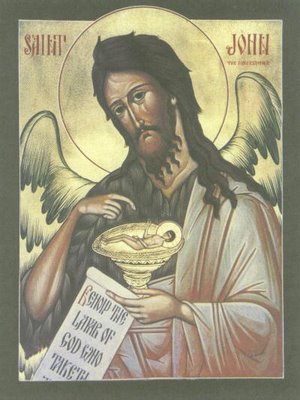
The honorable prophet and forerunner John the Baptist is commemorated on January 7.
The book Touching Heaven by John Oliver contains the following remarkable passage about the prophet John the Baptizer. Upon reading it, it became clear to me that these are also the characteristics of those who in our day have received the prophetic call from their Master Jesus Christ. May these words encourage them.
The portrait of St. John that emerges from the Gospels is that of a sane man who lives as if he is mad. His toned and disciplined body is dirtied with the matter of earth—sand, animal hair, vegetation. He dwells not in the dizzying centers of commerce, but in the desolate spaces of caves and open desert. We do not quite see him as a loner, but as a man who will only move in company as fiercely single-minded as he. He is not diplomatic, but deeply humane.
St. John takes each step through the Gospel narrative with the strength of generations of Hebrew prophets behind him. Specifically, we are told that he comes in “the spirit and power of Elijah” (Luke 1:17). That prophet was a burning flame who engulfed idolatrous Israel and its wicked king in a spoken truth that was unrelenting, unambiguous, and untamed. So we are not surprised when John the Baptist delivers a similar blow to the gut of the Jordanian community. He is not polite, but he is loving enough to passionately call for people to do what is best for themselves: “Bear fruits worthy of repentance” (Luke 3:8). His advice is timeless.
The biblical texts devoted to St. John reveal not only a deep vocation to his life, but his keen awareness of it. He voluntarily dwells in the desert—a landscape of shadowy death that compels man to cling to the necessities of life. And what emerges from the pages of those texts is that what is necessary for life is more than food and drink. St. John is more interested in the soul than in the stomach. Our Lord tells us that the Baptist “came neither eating bread nor drinking wine” (Luke 7:33). There is, to St. John's life, a conspicuous absence of frivolity and wasted time. He is not a “reed shaken by the wind” who conforms to the whims and trends of his culture, nor is he one “clothed in soft garments” who cavorts among the prestigious and powerful (Luke 7:24-25). No, St. John lives simply and close to the earth. He is acquainted with the basic wisdom of nature. And he recognizes that Wisdom even from a distance when He comes to him to be baptized.
Skipping ahead just a couple of paragraphs, I want to close with this final thought.
People drawn to St. John must have been the kind who were ready to trust a promise. “I am not the One for whom you seek,” he announces with conviction, “but after me comes One more powerful than I, the thongs of whose sandals I am not worthy to stoop down and untie.” He tells his followers to wait a little longer, not in idleness but in a spirit of preparation. Jesus is coming.
Yes, indeed, my brothers and sisters! Jesus is coming… and soon, “for the time is close.” (Revelation 1:3).



2 comments:
"a sane man who lives as if he is mad.... We do not quite see him as a loner, but as a man who will only move in company as fiercely single-minded as he."
Loner-ness connected with the realness of all humanity, preparing the Way! Thanks for reminding us of this encouraging and empowering living model, often forgotten, Romanós.
Romanós,
You are gifted with the power of expression and have wisdom rare on this earth. Thank you for the reminder of the role of a Prophet. The church has always been uncomfortable with her prophets, even to the point of saying that the role is no longer viable! But God is raising up many Prophets who will challenge the artificialness, commercialization, and self-gratifying nature of today’s Laodicean church. “You say, “I am rich; I have acquired wealth and do not need a thing.' But you do not realize that you are wretched, pitiful, poor, blind and naked.” Because Christ loves you, He is warning you and will discipline you. Oh that Christ’s desire for His People to Be One would be seen in our day! Only His Love can make it happen! Prophet R.
Post a Comment